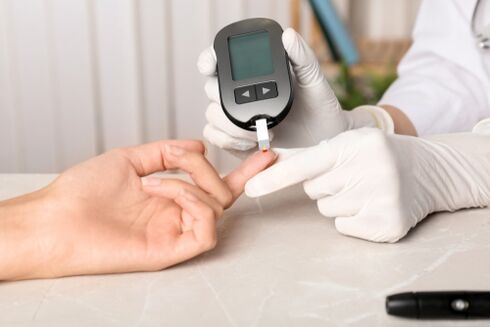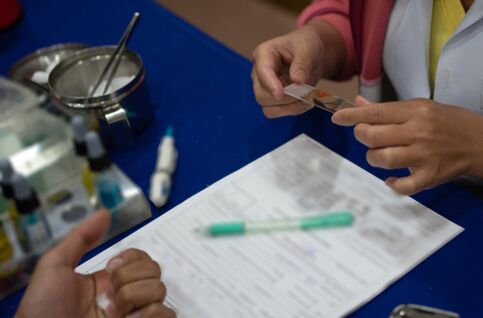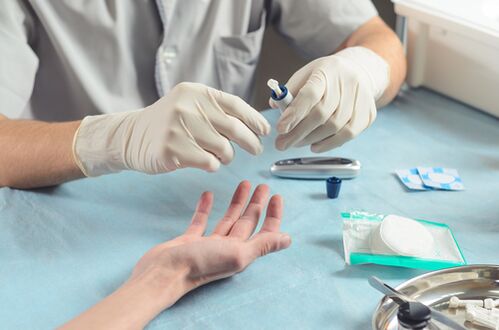
Diabetes Mellitus is a chronic endocrine disease characterized by the impossibility of absorption of glucose that comes from food and necessary for nutrition, breathing and energy metabolism cells. In this case, production or interaction with the hormone pancreas - insulin is damaged. It is necessary to regulate the quantitative presence of glucose in the bloodstream. With improper operation of a pair of glucose -sensulin, hyperglycemia is persistent in glucose increases. Metabolism suffers, the work of kidney, hearts, blood vessels and central nervous systems is upset.
Types of diabetes
The two main varieties of diabetes, although they belong to single-leaf diseases, are still different, they still have differences.
First type of diabetes (insulin-notion, minors, INZD and type)
It is characterized by the fact that for any reason the immune system attack the pancreas beta cell (more than 80%), producing insulin. There is no hormone, but glucose is constantly delivered in the body with food. The blood sugar is lowered with a scale. The first type diabetes are most often revealed in childhood or adolescence. But for adults, that is not uncommon.
Second type diabetes (Insulin -Depeten, II II II)
Type II diabetes are more often diagnosed in people after 30-40 years. But the disease becomes younger. In 90% of cases in patients, surplus weight is observed. The body can still produce insulin, but the sensitivity of cells on insulin is reduced (this is called insulin resistance). A vicious circle appears. Stations do not feel insulin, the body produces even more insulin to feed; Cage. Glucose simply accumulates blood, and insulin increases appetite. The person eats, jumps sugar, an insulin resistance is intensified.
Prediabet
Here, the glucose level transcends the reference values, but you can't even discuss diabetes. Prediabet can become the basis for the development of type II diabetes, as well as a cardiovascular system disease.
Gestational diabetes are characteristic during pregnancy. It is most often found in II or III quarter.
Also, the course of the disease is different in seriousness: light (s), medium (II) and heavy (III).
Diabetes. Symptoms
If you don't have a habit of donating blood for glucose once a year, and you don't know the endocrinologist from the clinic personally, there are a number of symptoms that I can tell you that it is time to contact experts. But we will book immediately, the signs of diabetes are manifested if the lack of insulin is already moved to a critical point. Therefore, at this point, the most effective way to find out your sugar level is to donate blood.

First type diabetes
First type diabetes symptoms:
- Constant, insatiable thirst;
- dry mouth;
- Frequent urination;
- apathy and fatigue;
- insatiable hunger;
- Weight loss (average 3-5 kg), which does not apply to any acting person;
- Vida problems (ambiguity of the image, as if everything is in the fog).
Another type diabetes
The symptoms of the diabetes of the second type are similar to the type and diabetes in some parameters: it is thirst, hunger, dry mouth, fatigue, vision problems and frequent toilets for the toilet. But this guy has his signs:
- stiffness and tingling in the hands and legs;
- Slow healing and recurring infections.
Causes of diabetes

Wow, scientists cannot appoint the exact causes of diabetes development in humans (especially the first species). Bad ecology, abundance of viral infections and inadequate effects of the immune system is taken as a basis. Among the causes of diabetes development are usually different: Mellitus is usually different:
- Hereditary predisposition. Moreover, the risk reaches 10% if the father is sick with the diabetes of the first type, and 2, 5% if the mother is. If both parents are diagnosed with diabetes type II, then the child has the risk of this disease after 40 years increases at 65-70%;
- Unbalanced diet with carbohydrate abundance;
- Excess weight (90% of people with II II INZSD has);
- lack of physical activity;
- Stress at a constant level;
- prediabet;
- extended use of certain medications (diuretics, hormonal, salicylates, cytostatics, etc. );
- Ethnicity (in European race children, the risk of developing the first type diabetes);
- History of gestational diabetes;
- Chronic insufficiency of the adrenal cortex.
Complications
This disease is insidious, and if you do not follow the doctor's instructions, the complications of diabetes (chronic and acute) can occur, which endangers the work of the entire organism. Chronic complications are observed when a high level of sugar takes a long time.

The following chronic complications may differ:
- Branches of blood vessels in the retina (retinopathy) leads to a reduction in the sharpness of sight, early cataract development or causing blindness.
- Diabetes often happens periodontitis, which leads to tooth loss or heart problems. Also, different infectious diseases of the oral cavity are possible. It is necessary to take good observation hygiene and visit the dentist regularly.
- Cardiovascular diseases are the most common causes of disability and mortality among diabetics. Angina pectoris, myocardial infarction, stroke and others. Lack of observation of cholesterol and glucose levels, increased blood pressure contributes to the development of these complications.
- Nephropathy or destruction of blood vessels in the kidney leads to the failure of functioning or renal refusal. Hell is required.
- Neuropathy (nerve damage). The most common risk is neuropathy exposed to legs. The walls of the vessel and nerve vlakians were destroyed, blood flow to your feet is deteriorating. Signs of development of neuropathy are running, pain, crawling goosebumps or loss of sensitivity. Patients, especially older, usually do not fasten the meaning of that, which is full of developing ulcers, infectious diseases and amputations. Neuropathy may affect other body systems (erectile dysfunction, gastrointestinal strip problems, genitourin system).
- Diabetes is one of the causes of atherosclerosis, because the vessels become fragile, fragile and increase the risk of thrombus.
- The joints are often pain, because diabetes leads to a reduction in the amount of sinny liquid.
- Also, there is a high frequency of developing mental disorders.
Acute complications, they develop quickly, are usually interconnected by fluctuations in blood glucose. Low (hypoglycemia) and high (hyperglycemia) lead to a crisis. The hypoglycemia crisis (3, 9 mmol / l or lower) are manifested as seizure, and hyperglycemic crises are dangerous for the occurrence of diabetic ketoacidosis and hyperosomolar hyperglycemic. These are emergency and threatening conditions, leading to convulsions, to whom and fatal outcome.
Diabetes diagnosis
Diabetes diagnosis is an important step. In an ideal situation, a person should be aware of his glucose level, especially after 45 years. But if it is in danger, then the analysis should be spent more often and you need to do it earlier, so don't miss the precious time.

Diabetes is diagnosed in several ways:
- Analysis for glycose hemoglobin. The results of the analysis show the average blood glucose level in the last 2-3 months. So you can follow the dynamics;
- Glucose analysis in blood plasma (capillary or venolob) on an empty stomach. The audit currently shows the position of glucose;
- The gluczotolerant test is prescribed in suspicious cases. The test lasts quite a long time and includes the measurement of glucose levels before and after taking a glass of water with glucose dissolved in it;
- Urine analysis for the presence of glucose and / or acetone. A healthy person does not characterize the presence of these elements in the urine.
Treatment

When treating diabetes Mellitus, the main treatment for insulin is the main treatment for insulin, which must be applied every day in a dose prescribed and calculating doctors attending. You can use special insulin syringes, syringes or insulin pumps, independently calculating the required dose of the submitted hormone. Under certain conditions, it is possible to prescribe drugs for diabetes that encourage the body for the development of their own insulin.
In the diabetes of the first species, the chip insulin every day, as passes are full of diabetic ketoacidosis, which leads to death. Daily insulin + Proper nutrition + physical activity can provide life without complications.
With type II diabetes, the doctor prescribes drug treatment designed to reduce sugar levels and the normalization of the person's condition. Sometimes it may be necessary for insulin substitution therapy, but it should not be received daily. Diet in diabetes is observed without failure, as well as increasing physical activity, body weight control.
In the presence of pre-diabetes, the test must be carried out once in six months or a year. It is also necessary to solve redundant weight and switch to nutrition nutrition.
With gestative diabetes, it is necessary to carefully monitor the blood glucose level and follow the recommendations of the observed doctor. Most often after childbirth, blood sugar returns to normal. But there is a risk of developing another type diabetes.
Forecast and prevention
Diabetes Mellitus is a serious endocrine disease that reduces life in 5-10 years, and men die more often than women. Infectious and viral diseases are tolerated stricter. Complications against pneumonia backgrounds, the flu occurs 6 times more often, compared to people's statistics without diabetes in history. In healthy people, in relation to diabetics, Alzheimer and other forms of dementia develop less often.

But with diabetes you can and should fight them. The competent management helps them to avoid many problems and complications. Thus, 50-60% of cases of diseases are stabilized and not progressing.
Proper control and prevention of diabetes is:
- Regular glucose check;
- Special diet for diabetes;
- Playing sports in moderate mode;
- Blood pressure observation and cholesterol;
- Regular visits to the necessary experts and subjected surveys;
- Taking medications prescribed by a doctor.
Diabetes is not fully studied, but medications and aware of the attitude towards their lives with this disease will help live long and without complications.
























